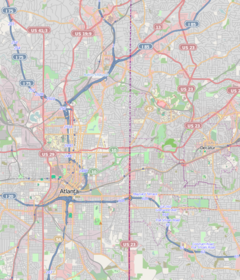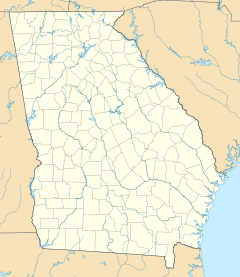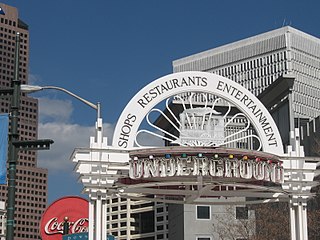
Underground Atlanta is a shopping and entertainment district in the Five Points neighborhood of downtown Atlanta, Georgia, United States, near the Five Points MARTA station. It is currently undergoing renovations. First opened in 1969, it takes advantage of the viaducts built over the city's many railroad tracks to accommodate later automobile traffic.
East Atlanta is a neighborhood on the east side of Atlanta, Georgia, United States. The name East Atlanta Village primarily refers to the neighborhood's commercial district.

Five Points is a district of Atlanta, Georgia, United States, the primary reference for the downtown area.

Lenox Square is a shopping mall in the Buckhead district of Atlanta, Georgia. With 198 tenants and 1,558,678 square feet (144,805.9 m2) of gross leasable area, it is the third-largest mall in Georgia. The mall is currently owned and managed by Simon Property Group, and is considered a sister mall to the adjacent, Simon-owned Phipps Plaza. The mall features Macy's, Bloomingdale's, and Neiman Marcus.
Kirkwood is a national historic designated neighborhood on the east side of Atlanta, Georgia, United States. It is a historic streetcar suburb situated entirely in DeKalb County, bordered by the neighborhoods of Lake Claire, East Lake, Edgewood, and Oakhurst. Kirkwood is bound on the north by DeKalb Avenue, on the south by Memorial Drive and Interstate 20, on the west by Montgomery Street, and on the east by 1st Ave. A large part of the neighborhood is listed on the National Register of Historic Places as Kirkwood Historic District.

Walter Arthur Sims was an American politician.

The Sweet Auburn Historic District is a historic African-American neighborhood along and surrounding Auburn Avenue, east of downtown Atlanta, Georgia, United States. The name Sweet Auburn was coined by John Wesley Dobbs, referring to the "richest Negro street in the world," one of the largest concentrations of African-American businesses in the United States.

North Market is a food hall and public market in Columbus, Ohio. The Downtown Columbus market was established in 1876, and was the second of four founded in Columbus. The market is managed by the non-profit North Market Development Authority (NDMA), which also manages North Market Bridge Park, a market in Dublin, Ohio.

The Great Atlanta Fire of 1917 began just after noon on 21 May 1917 in the Old Fourth Ward of Atlanta, Georgia. It is unclear just how the fire started, but it was fueled by hot temperatures and strong winds which propelled the fire. The fire, which burned for nearly 10 hours, destroyed 300 acres (120 ha) and 1,900 structures displacing over 10,000 people. Damages were estimated at $5 million,.

Joel Hurt (1850–1926) was an American businessman. He was the president of Trust Company of Georgia, and a developer in Atlanta. He was one of the many founders of SunTrust Bank.

The Maine Avenue Fish Market, also known as the Municipal Fish Market, the Fish Wharf, or simply, the Wharf, is an open-air seafood market in Southwest Washington, D.C., a local landmark and one of the few that remain on the east coast of the United States. It is the oldest continuously operating fish market in the United States, founded 17 years earlier than New York City's Fulton Fish Market.

The Old Fourth Ward, often abbreviated O4W, is an intown neighborhood on the eastside of Atlanta, Georgia, United States. The neighborhood is best known as the location of the Martin Luther King Jr. historic site.

A marketplace, market place or just market is a location where people regularly gather for the purchase and sale of provisions, livestock, and other goods. In different parts of the world, a marketplace may be described as a souk, bazaar, a fixed mercado (Spanish), or itinerant tianguis (Mexico), or palengke (Philippines). Some markets operate daily and are said to be permanent markets while others are held once a week or on less frequent specified days such as festival days and are said to be periodic markets. The form that a market adopts depends on its locality's population, culture, ambient and geographic conditions. The term market covers many types of trading, as market squares, market halls and food halls, and their different varieties. Thus marketplaces can be both outdoors and indoors, and in the modern world, online marketplaces.

Pike Place Market is a public market in Seattle, Washington, United States. It opened on August 17, 1907, and is one of the oldest continuously operated public farmers' markets in the United States. Overlooking the Elliott Bay waterfront on Puget Sound, it serves as a place of business for many small farmers, craftspeople and merchants. It is named for its central street, Pike Place, which runs northwest from Pike Street to Virginia Street on the western edge of Downtown Seattle. Pike Place Market is Seattle's most popular tourist destination and the 33rd most visited tourist attraction in the world, with more than 10 million annual visitors.
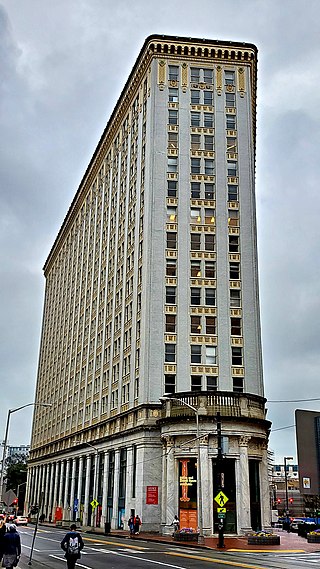
The Hurt Building is an 18-story building located at 50 Hurt Plaza in Atlanta, Georgia with a unique triangular shape. One of the nation's earliest skyscrapers, the Hurt Building was built between 1913 and 1926, and was the initial home for the Federal Reserve Bank of Atlanta. It was renovated in 1985. It was added to the National Register of Historic Places in 1977.
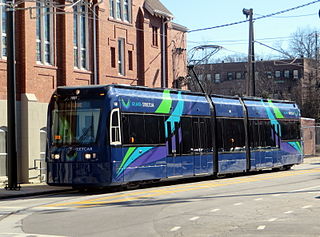
The Atlanta Streetcar is a streetcar line in Atlanta, Georgia. Testing on the line began in summer 2014 with passenger service beginning as scheduled on December 30, 2014. In 2023, the line had 184,500 rides, or about 600 per weekday in the fourth quarter of 2023.
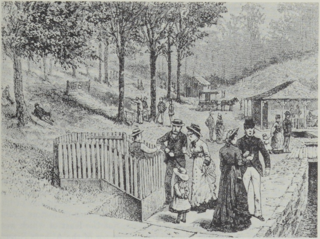
Ponce de Leon Springs was a mineral spring in Atlanta, Georgia, in the United States. The spring was a popular tourist destination from the mid-1800s through the early 1900s. Around the turn of the century, the land surrounding the spring was developed into an amusement park. By the 1920s, the amusement park was demolished, and the area was developed for industrial and, later, commercial properties.
In 1994 the Atlanta Housing Authority, encouraged by the federal HOPE VI program, embarked on a policy created for the purpose of comprehensive revitalization of severely distressed public housing developments. These distressed public housing properties were replaced by mixed-income communities.
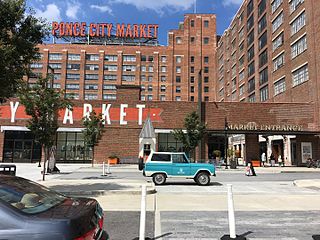
Eastside refers to the city district comprising the easternmost portion of Atlanta, Georgia, United States. The Eastside generally encompasses the area bounded on the west by Midtown Atlanta and Downtown Atlanta and on the east by the city limits. The central corridor of the district is the BeltLine Eastside Trail, which connects northern Eastside neighborhoods with those to the south. The Eastside is known for its nightlife establishments, craftsman architecture, local eateries, and quirky public art.

Edgewood Avenue is a street in Atlanta, Georgia, United States which runs from Five Points in Downtown Atlanta, eastward through the Old Fourth Ward. The avenue runs in the direction of the Edgewood neighborhood, and stops just short of it in Inman Park. Edgewood Avenue was first important as the route of a streetcar line to Inman Park, Atlanta's first garden suburb and home to many of its most prominent citizens. Today, the avenue is known for its restaurants and nightlife around its intersection with Boulevard.


